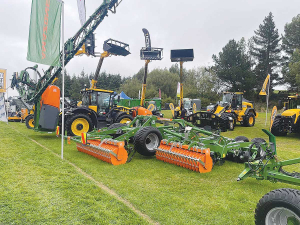The recent Tractor and Machinery Association (TAMA) conference in Wellington was signalling cautious optimism on the back of rising milk and store cattle prices and drops in interest rates.
Association president Jaiden Drought was using the term of “crest of a slump” to suggest things were moving in the right direction, which will be a welcome move for the country’s tractor and machinery importers and dealers, who have felt the brunt of the financial downturn over the last twelve months.
The depth of that slump makes for interesting reading, that to the year ending June 30 shows that the estimated sale value of the agricultural machinery has fallen by 10% to $503 million, with tractors said to be $435m (-6.5%) and balers and hay tools at $68m (-27%).
The reality is much more interesting, when it becomes obvious the rapidly rising purchase prices camouflage the fact that tractor unit sales had fallen by around 27% and balers and hay tools have fallen by 45% over the previous year – the latter representing the biggest drop in sales since records began.
The breakdown of tractor sales (to year ending 30 June) saw recorded sales of 2982 units, made up of 856 tractors in the 0-60hp bracket, 482 from 60 to 100hp, 1315 in the popular 100-200hp class and 329 units above 200hp. The last time this level of sales was seen, was in the 2015/16 calendar year and compares to a peak of 4538 in 2021/22. Baler and hay tool units peaked at 904 units.
Looking at sales on a national basis, tractor sales in the North Island totalled 1876 units, a drop of 22.8%, while the South Island ran to 1106 machines, a fall of 29.1%. Balers and hay tools saw 406 units sold in the North Island and 498 units sold on the mainland.
At a regional level, all parts of the country saw unit numbers dropping compared to the previous year, with the East Cape region in the north seeing the greatest drop of 41%, no doubt in the aftermath of Cyclone Gabrielle, and Wairarapa showing the least fall of 18%. Further south, Mid-Canterbury was 48% off the mark, with a 49% fall in the key 100-200hp sector, compared to its neighbour, South Canterbury, who fared much better with a drop of only 14%.
The two largest regions for tractor sales, Waikato in the North Island and Southland in the South Island saw sales levels that mirrored the fall in milk prices and inflated input prices, with falls of 29% and 30% respectively.











